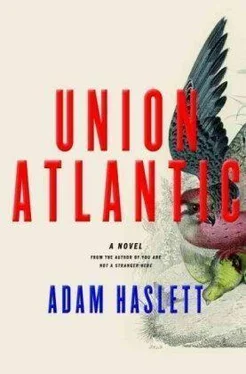“Oh come on, Henry, there’s no need to revert. We’re not playing house. I say these things because I think you understand them and most people don’t. I’m sorry if it sounds like criticism. It’s just conversation, as far as I’m concerned. I know you want to help me. I appreciate that.”
“Then why don’t you tell me what’s going on?”
“How do you mean? We won. The law did what it’s supposed to do. I would think you’d take some satisfaction in that.”
“I don’t mean about the land.” He watched a few familiar faces — the head of State Street, the head of Credit Suisse — coming through the entrance of the tent with their wives. “How am I supposed to say this? You’re my sister.”
“Ah. I see. You think I’m losing my mind.”
“I didn’t say that.”
“You didn’t have to. You meant it.”
“You’re barely eating,” he said. “And the way you talk to those animals of yours.”
“I knew it would come to that: the old lady and her pets. But the world’s bigger than you think, Henry. It always has been.”
“Meaning what?”
“Do you imagine Betsy is entirely dead?”
“Charlotte, please. Give the woman a little respect.”
“That’s precisely what I’m doing. I’m not talking about ghosts. I’m saying she’s not entirely gone. Not in you.”
“Of course not. I have memories like everyone else. But as they used to say in college, that’s ontologically trivial. Not to mention which, she’s got nothing to do with your dogs.”
“Well, there you are. You ask me what’s going on but you don’t actually want to know. Not unless you already understand it. There’s a lot of that going around at the moment — your kind of certainty.”
“Oh, come off it. Don’t try to make this about politics.”
“Like I said, it’s a much simpler world if you can separate things out like that. History’s a bit of a problem for you on that account, but then who am I to question the wisdom of the age? You’re no doubt efficient.”
Guests assigned to the table where the two of them had perched began arriving to take their seats, smiling cautiously in Charlotte and Henry’s direction.
“Come on,” she said. “Let’s get this over with. Where are we sitting?”
“Table one, apparently. I suppose they’ve put me with Holland.”
“Well then. Time to dine with your captors.”
As they walked toward the center of the room, Holland waved them over.
“Henry, I want you to meet Doug Fanning, head of foreign operations and special plans. He runs everything around here. Doug, this is Henry Graves, president of the New York Fed.”
For a moment the two of them beheld each other in disbelief, Henry watching his own shock reflected in Doug’s face, whose eyes had gone wide with amazement.
“Do you know each other?”
Before either could reply, Glenda appeared with Charlotte on her arm and proceeded to nudge Henry to one side.
“My husband is such an awful dunce. Of course they know each other, dear. Doug and Charlotte are neighbors. Don’t you listen to anything I say? Now,” she said, pulling out the chair beside Doug’s. “You’re right here, Charlotte. I’ve put the two of you side by side so you can have a good long talk. If you get to know him, you’ll see Mr. Fanning is an absolute sweetheart. And the fact is, Doug, that house of yours is a bit ugly. Nothing that a good hedge wouldn’t solve.”
Before Henry could intervene, Glenda grabbed him by the arm and led him around to the other side of the circle.
THROUGH THE salad course and the first glass of wine, Doug and Charlotte sat in silence, the volume of conversation around them growing steadily louder. Having got what he needed from Holland — verbal approval at least — Doug had tried to leave but Glenda had returned to drag him and Jeffrey into the yard.
How perfect, he thought now, how absolutely perfect that Charlotte Graves’s brother should be the president of the New York Fed, elected by a club of his colleagues, half from his alma mater no doubt. What could be more establishment? It made sense of her hubris — imagining herself a guardian of good order.
Before that courtroom charade, she had been an irritant. Now she was a problem. Judge Cushman’s order couldn’t be allowed to stand. Doug had already talked to Mikey about how to proceed. According to the public record, the Graves Society was a financial mess. They would attack the charity. If they could kick the struts out from under that, her argument would crumble. But they would need documentation faster than she would ever produce it.
“So!” she said, addressing herself to the silver-dipped roses at the center of the table just after their dinner plates had arrived. “Where is it you suppose you’ll go come September? A neighboring state, perhaps?”
Emptying his second glass of wine, Doug lifted his fork from the table, wondering how quickly she would bleed out from a stab to the heart.
“You were a schoolteacher, right?”
“That’s none of your business. But yes, I was.”
“Do they have mandatory retirement these days? Or was there some other reason you had to leave?”
“It’s incredible to me, Mr. Fanning, that a person could be quite so transparent as yourself. One imagines that adulthood comes with some minimum of complexity. You had one of your minions look back over the local paper, did you? Learned of my travails? How intrepid of you. Perhaps you already know, then, that my subject is history. Most of my fellow teachers, and the textbooks for that matter, presented the material as if it were a simple record, a kind of newscast to be placed in front of the young, for what reason these days no one’s particularly sure, beyond a few nostrums about not repeating ourselves. But that’s not the tack I took. I was a little more opinionated than that. I had the temerity to suggest that certain developments in human society were better or more dangerous or more evil than others, and I’m not talking about your standard twentieth-century horrors, the ones they throw in for free. I’m talking about people like you. The despoilers. The patriots of capitalism. Given the ubiquity of your type these days, is it any surprise they forced me out?”
Doug took a breath to calm himself and said, “I’m going to take a wild guess and say that you knew the Gammonds.”
“Herb and Ginger?” she said. “Of course. They were lovely people. Have you bought their land as well, then?”
“No. When I was a kid I knew them. My mother used to clean their house.”
“Is this some kind of joke?”
“No. I grew up in Alden.”
“I see,” she said, examining his face in earnest, considering this new fact. “I know what you see when you look at me. An old whatsit crying, ‘Not in my backyard.’ That’s what you say to yourself about what I’m doing. A crone who wants her trees back. Which I do. But I have to take my stand where I can. You probably won’t believe me when I say that it’s not personal, but it isn’t. I suppose I have allowed myself to think of you as a villain, but really it’s not you I despise. For all I know you’re a Democrat. It’s just what you stand for that I can’t abide. And I’m not so naïve as to think that running you off that land will solve the bigger problem, but at least I will have done that.
“I wonder, Mr. Fanning. If you were to see a lone soldier fighting an army, what would you think of him? That he is a fool? Or that he simply believes in his cause?”
“Neither. I’d say he was going to lose.”
“Right. Because that matters more than anything to you, doesn’t it? Dominance. That’s the childish pleasure you people can’t get enough of. You get your fix dressed up in a suit, but it’s no different than a drug. You’re angry. And once the men like you start this war of theirs, people will die by the thousands to cure that feeling in them.”
Читать дальше












